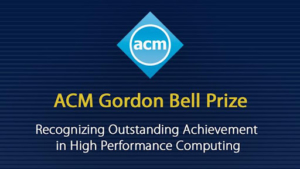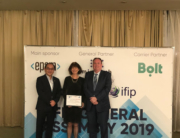Gordon Bell Prizes Awarded at SC22 Conference
 A 16-member team drawn from French, Japanese, and US institutions was awarded the 2022 ACM Gordon Bell Prize for their project, “Pushing the Frontier in the Design of Laser-Based Electron Accelerators With Groundbreaking Mesh-Refined Particle-In-Cell Simulations on Exascale-Class Supercomputers.” In their prize-winning work, the researchers presented a first-of-kind mesh-refined (MR) massively parallel Particle-In-Cell (PIC) code-In-Cell (PIC) code for kinetic plasma simulations optimized on the Frontier, Fugaku, Summit, and Perlmutter supercomputers.
A 16-member team drawn from French, Japanese, and US institutions was awarded the 2022 ACM Gordon Bell Prize for their project, “Pushing the Frontier in the Design of Laser-Based Electron Accelerators With Groundbreaking Mesh-Refined Particle-In-Cell Simulations on Exascale-Class Supercomputers.” In their prize-winning work, the researchers presented a first-of-kind mesh-refined (MR) massively parallel Particle-In-Cell (PIC) code-In-Cell (PIC) code for kinetic plasma simulations optimized on the Frontier, Fugaku, Summit, and Perlmutter supercomputers.
The ACM Gordon Bell Prize tracks the progress of parallel computing and rewards innovation in applying high performance computing to challenges in science, engineering, and large-scale data analytics. The award was presented during the SC22: The International Conference for High Performance Computing, Networking, Storage and Analysis.
Also at SC22, the 2022 ACM Gordon Bell Special Prize for High Performance Computing-Based COVID-19 Research was presented to a 12-member team for their project, “GenSLMs: Genome-Scale Language Models Reveal SARS-Cov-2 Evolutionary Dynamics” which seeks to transform how new and emergent variants of pandemic causing viruses, specially SARS-CoV-2, are identified and classified.
This special prize is being awarded to recognise outstanding research achievement toward the understanding of the COVID-19 pandemic through the use of high-performance computing.
Jack Dongarra Delivers ACM A.M. Turing Award Lecture at SC22
 2021 ACM A.M. Turing Award recipient Jack Dongarra delivered his Turing Lecture Nov. 15 at SC22: The International Conference for High Performance Computing, Networking, Storage, and Analysis. In the lecture “A Not So Simple Matter of Software,” Dongarra examines how high-performance computing has changed over the last 40 years, looks toward future trends, and discusses how a new generation of software libraries and algorithms is needed to use dynamic, distributed, and parallel environments effectively.
2021 ACM A.M. Turing Award recipient Jack Dongarra delivered his Turing Lecture Nov. 15 at SC22: The International Conference for High Performance Computing, Networking, Storage, and Analysis. In the lecture “A Not So Simple Matter of Software,” Dongarra examines how high-performance computing has changed over the last 40 years, looks toward future trends, and discusses how a new generation of software libraries and algorithms is needed to use dynamic, distributed, and parallel environments effectively.
View the lecture on ACM’s YouTube account.
Young Researchers: Apply for the 10th Heidelberg Laureate Forum, Sep. 24 – 29, 2023
 Young researchers are invited to apply for one of the 200 coveted spots to participate in the Heidelberg Laureate Forum (HLF), an annual event. The HLF offers all accepted young researchers the great opportunity to personally meet the winners of the most prestigious prizes in their fields.
Young researchers are invited to apply for one of the 200 coveted spots to participate in the Heidelberg Laureate Forum (HLF), an annual event. The HLF offers all accepted young researchers the great opportunity to personally meet the winners of the most prestigious prizes in their fields.
For one week, the most prominent figures in computer science will engage in a cross-generational scientific dialogue with young researchers in Heidelberg, Germany. Young researchers can apply to attend the 10th HLF from Friday, November 11, 2022 until Saturday, February 11, 2023.
Application information can be found here.
Join a HotTopics Webinar on Algorithmic Responsibility
 Algorithmic systems, often based on artificial intelligence, are increasingly being used globally by governments and companies to make or recommend decisions that have far-reaching effects on individuals, organizations, and society. While such systems hold the promise of making society more equitable, inclusive, and efficient, those results do not automatically flow from automation. Like decisions made by humans, machine-made ones can also fail to respect the rights of individuals and result in harmful discrimination and other negative effects.
Algorithmic systems, often based on artificial intelligence, are increasingly being used globally by governments and companies to make or recommend decisions that have far-reaching effects on individuals, organizations, and society. While such systems hold the promise of making society more equitable, inclusive, and efficient, those results do not automatically flow from automation. Like decisions made by humans, machine-made ones can also fail to respect the rights of individuals and result in harmful discrimination and other negative effects.
Join a panel of ACM experts—Ricardo Baeza-Yates, Lorena Jaume-Palasi, Jeanna Matthews, and Alejandro Saucedo—moderated by Technology Policy Council Chair Jim Hendler on Thursday, December 1 from 3–4:30pm EST (8–9:30pm UTC) for a transatlantic deep dive into the Council’s new Statement on Principles for Responsible Algorithmic Systems and an exploration of the legal, ethical, and scientific implications of life in the new machine age
Watch the ACM TechTalk with Raquel Urtasun
 Register now for the TechTalk, “An AI-First Approach to Accelerating Autonomous Trucking,” taking place Wednesday, December 7, 12 pm EST (5 pm UTC). Founded in 2021 by world-leading AI pioneer Raquel Urtasun, Waabi is a next-generation autonomous vehicle company with a radically new AI-first approach to autonomous driving, starting with the trucking industry. In this talk, Raquel will dive into the ground-breaking AI-first approach needed to accelerate autonomy, and what it takes to bring the promise of self-driving closer to commercialisation than ever before.
Register now for the TechTalk, “An AI-First Approach to Accelerating Autonomous Trucking,” taking place Wednesday, December 7, 12 pm EST (5 pm UTC). Founded in 2021 by world-leading AI pioneer Raquel Urtasun, Waabi is a next-generation autonomous vehicle company with a radically new AI-first approach to autonomous driving, starting with the trucking industry. In this talk, Raquel will dive into the ground-breaking AI-first approach needed to accelerate autonomy, and what it takes to bring the promise of self-driving closer to commercialisation than ever before.
Visit the TechTalks Archive for our full archive of past TechTalks.
Featured ACM Member: Sebastian Deterding
 Sebastian Deterding is a Professor in the Dyson School of Design Engineering at Imperial College London. He has worked extensively in game design, behavioral and motivational design, design ethics, and computational creativity, and is most well-known for his pioneering work on gamification. In his interview, he discusses how he initially became interested in game design, recent advances in AI gamification, his role as Co-Editor-in Chief of ACM Games: Research and Practice (GAMES), and the impact of gaming on society and individuals.
Sebastian Deterding is a Professor in the Dyson School of Design Engineering at Imperial College London. He has worked extensively in game design, behavioral and motivational design, design ethics, and computational creativity, and is most well-known for his pioneering work on gamification. In his interview, he discusses how he initially became interested in game design, recent advances in AI gamification, his role as Co-Editor-in Chief of ACM Games: Research and Practice (GAMES), and the impact of gaming on society and individuals.
Read Deterding’s interview here.
Featured ACM Member: Yuta Sugiura
 Yuta Sugiura is an Associate Professor at Keio University in Yokohama, Japan. His research interests include human-computer interaction, ubiquitous computing, and medical informatics. He has served as a program committee member for various international conferences, including ACM UIST, TEI, and SIGGRAPH ASIA E-Tech. Sugiura was the recipient of the Information Processing Society of Japan (IPSJ/ACM) Award for Early Career Contributions to Global Research. In his interview, he discusses his interest in human-machine interaction, his work with the Cuddly User Interface (Cuddly UI), the future of smart homes, and his efforts in the medical engineering field.
Yuta Sugiura is an Associate Professor at Keio University in Yokohama, Japan. His research interests include human-computer interaction, ubiquitous computing, and medical informatics. He has served as a program committee member for various international conferences, including ACM UIST, TEI, and SIGGRAPH ASIA E-Tech. Sugiura was the recipient of the Information Processing Society of Japan (IPSJ/ACM) Award for Early Career Contributions to Global Research. In his interview, he discusses his interest in human-machine interaction, his work with the Cuddly User Interface (Cuddly UI), the future of smart homes, and his efforts in the medical engineering field.
Read Sugiura’s interview here.
ACM ByteCast Interviews Yaw Anokwa
 ACM ByteCast is ACM’s series of podcast interviews with researchers, practitioners, and innovators who are at the intersection of computing research and practice. In the latest episode, our special guest host Scott Hanselman (of The Hanselminutes Podcast) welcomes research scientist, software engineer, and entrepreneur Yaw Anokwa. Yaw is the founder and CEO of ODK (Open Data Kit), the offline data collection platform that helps fight disease, poverty, and inequity. He holds a PhD in computer science from the University of Washington. In his interview, Yaw describes how he felt the urge to pivot his career into a direction of positive social impact as a graduate student, how a volunteer experience with Partners in Health in Rwanda and a software engineering internship at Google showed him the potential for technology to empower people and change lives, and the joy of working on a product that focuses on public good and some principles that have helped him to succeed.
ACM ByteCast is ACM’s series of podcast interviews with researchers, practitioners, and innovators who are at the intersection of computing research and practice. In the latest episode, our special guest host Scott Hanselman (of The Hanselminutes Podcast) welcomes research scientist, software engineer, and entrepreneur Yaw Anokwa. Yaw is the founder and CEO of ODK (Open Data Kit), the offline data collection platform that helps fight disease, poverty, and inequity. He holds a PhD in computer science from the University of Washington. In his interview, Yaw describes how he felt the urge to pivot his career into a direction of positive social impact as a graduate student, how a volunteer experience with Partners in Health in Rwanda and a software engineering internship at Google showed him the potential for technology to empower people and change lives, and the joy of working on a product that focuses on public good and some principles that have helped him to succeed.
Listen here or wherever you get podcasts.
Featured ACM Distinguished Speaker: Zitao Liu
 Zitao Liu is the Head of AI Lab at TAL Education Group (NYSE:TAL), one of the largest leading education and technology enterprises in China. His research is in the area of machine learning, and includes contributions in the areas of artificial intelligence in education, multimodal knowledge representation and user modeling. Specifically, he studies and develops AI approaches to tackle some of the hard-core problems in AIED, such as automatic short answer grading, knowledge tracing, dropout prediction, class activity detection, etc. His lecture topics include “AI the Next Step for Education: Tech Innovations Making Our Classrooms Smarter.”
Zitao Liu is the Head of AI Lab at TAL Education Group (NYSE:TAL), one of the largest leading education and technology enterprises in China. His research is in the area of machine learning, and includes contributions in the areas of artificial intelligence in education, multimodal knowledge representation and user modeling. Specifically, he studies and develops AI approaches to tackle some of the hard-core problems in AIED, such as automatic short answer grading, knowledge tracing, dropout prediction, class activity detection, etc. His lecture topics include “AI the Next Step for Education: Tech Innovations Making Our Classrooms Smarter.”





